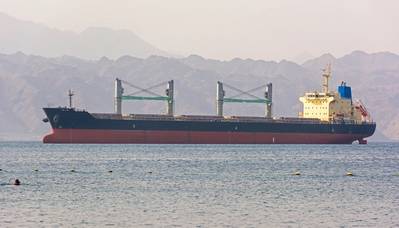Cameras to Replace Peacekeepers at Strategic Red Sea Strait
Remote-controlled cameras will take over responsibility from U.S.-led peacekeepers for ensuring international shipping retains freedom of access to the Gulf of Aqaba, whose coastline is shared by Israel and three Arab nations, officials said.
Tiran island, which lies in the straits of the same name at the mouth of the gulf, was handed to Saudi Arabia from Egypt along with next-door Sanafir island in 2017.
During a visit to Israel and Saudi Arabia last week, U.S. President Joe Biden announced that the tiny Multinational Force and Observers (MFO) contingent on Tiran would depart.
The MFO monitors a 1979 U.S.-brokered peace accord between Egypt and Israel, which deployed peacekeepers across the demilitarized Sinai and - to ensure free movement in and out of the Gulf of Aqaba - atop Tiran.
The Straits of Tiran have a checkered history: Egypt blockaded them in May 1967, among triggers for its war with Israel the next month. The countries fought another war in the Sinai in 1973.
Any MFO redeployment from the island requires Egyptian, U.S. and Israeli agreement. None of those countries, nor the MFO, has publicly discussed when the contingent will leave nor what might follow.
But an official from one of the countries told Reuters: "The peacekeepers will be replaced by a camera-based system."
Two officials from another of the countries said cameras already in place at an MFO base in the Egyptian resort of Sharm el-Sheikh, 4 km (2.5 miles) across the Straits of Tiran from the now Saudi-held islands, would be upgraded for the task.
A diplomatic source who has visited Tiran said the MFO had cameras there as well. Should such cameras be kept and operated, it could entail security coordination between Israel and Saudi Arabia, which have no formal ties.
A person in Washington familiar with the matter said the agreement called for cameras to be placed at the contingent's existing facilities, leaving open the possibility of both Sharm el-Sheikh and Tiran as placement sites.
"It was important to Israel that as part of this process there be no compromising the commitment Israel got from Egypt, back with the peace deal, most importantly regarding freedom of shipping," said Michael Herzog, Israeli ambassador to the United States.
"This matter has been addressed," he told Tel Aviv radio station 102 FM.
(Reuters - Additional reporting by Ahmed Mohamed Hassan and Aidan Lewis and Matt Spetalnick; Writing by Dan Williams; editing by John Stonestreet)













